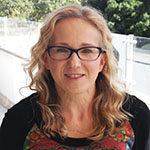 STAT News, a Boston Globe Media company, recently interviewed Keith Bellizzi for a story “As more patients get automated test results, researchers seek ways to calm their nerves,” to accompany a newly published study in JAMA Netw Open. 2025;8(4):e254019. doi:10.1001/jamanetworkopen.2025.4019. Story link: https://www.statnews.com/2025/04/08/what-refreshing-your-online-medical-test-result-page-says-about-anxiety/
STAT News, a Boston Globe Media company, recently interviewed Keith Bellizzi for a story “As more patients get automated test results, researchers seek ways to calm their nerves,” to accompany a newly published study in JAMA Netw Open. 2025;8(4):e254019. doi:10.1001/jamanetworkopen.2025.4019. Story link: https://www.statnews.com/2025/04/08/what-refreshing-your-online-medical-test-result-page-says-about-anxiety/
Faculty
UConn Waterbury early childhood program featured in UConn Today
 The UConn Waterbury early childhood program was featured in UConn Today! Learn more about Cora D’Alessandro’s role bringing the program to Waterbury, and one of the first students there, Alee Ennis ’25 (HDFS): https://today.uconn.edu/2025/04/local-partnership-expands-early-childhood-development-training-for-uconn-waterbury-students/
The UConn Waterbury early childhood program was featured in UConn Today! Learn more about Cora D’Alessandro’s role bringing the program to Waterbury, and one of the first students there, Alee Ennis ’25 (HDFS): https://today.uconn.edu/2025/04/local-partnership-expands-early-childhood-development-training-for-uconn-waterbury-students/
HDFS faculty and grad students present at SRCD conference
At least 12 faculty and 10 graduate students will be giving at least 16 presentations at the Society for Research in Child Development (SRCD) Biennial Meeting 2025 in May in Minneapolis! Find a listing of them here!
LaRusso and Ferreira van Leer highlighted in UConn Today article


UConn Today recently highlighted Maria LaRusso and Kevin Ferreira van Leer for their participation in the public health celebration with the UConn Public Health House Learning Community where they were part of a panel of researchers sharing their work on school and child health and how undergraduates can get involved in research. https://today.uconn.edu/2025/04/learning-community-students-celebrate-public-health-week-with-child-health-researchers/
Annamaria Csizmadia ,HDFS Faculty Spotlight, May 2025
 Annamaria Csizmadia is a scholar-teacher of cultural diversity. She has spent the past two decades studying how culturally relevant and group-specific factors shape developmental processes among monoracial and Multiracial (including immigrant) youth of color. She investigates how youth of color develop a positive ethnic-racial identity and the role that families play in helping youth navigate life in a racialized society where access to resources and opportunities is determined based on one’s race (as well as class and gender). She has a special interest in Multiracial youth development (in part because she is the proud mother of a wonderfully brilliant Multiracial daughter).
Annamaria Csizmadia is a scholar-teacher of cultural diversity. She has spent the past two decades studying how culturally relevant and group-specific factors shape developmental processes among monoracial and Multiracial (including immigrant) youth of color. She investigates how youth of color develop a positive ethnic-racial identity and the role that families play in helping youth navigate life in a racialized society where access to resources and opportunities is determined based on one’s race (as well as class and gender). She has a special interest in Multiracial youth development (in part because she is the proud mother of a wonderfully brilliant Multiracial daughter).
Her work is informed by cultural ecological and critical race theories. In this research she highlights the important role of family ethnic-racial socialization, such as how parents teach children pride in their race, ethnicity, and culture, and help them cope with bias and discrimination. Her research demonstrates that these socialization practices along with other culture-specific parenting behaviors contribute to social-emotional adjustment among youth of color in important ways. Furthermore, she found that how parents identify their child’s race is a highly salient form of ethnic-racial socialization in families of Multiracial youth. Her theoretical and empirical work emphasizes the dynamic interaction of family socialization, Multiracial youth’s social cognition, and their social environment that shapes Multiracial youth development.
Alongside family practices and youth’s identity-related social cognition, Annamaria seeks to understand how influences outside the family shape development in monoracial and Multiracial youth. To this end, she has done some work on racial microaggressions. In 2019-2020, as part of the UConn Racial Microaggression Study research team, she surveyed over 1,200 UConn students of color to learn about their experiences with racial microaggressions in and outside the classroom. The study revealed that students who reported more interpersonal experiences that communicated to them invalidation, insult, or derogatory messages due to their racial group also reported lower levels of psychological well-being and more discrimination-related trauma symptoms. The team presented their research to the University administration and disseminated it through campus news and the Hartford Courant to inform policy change and the community.
Annamaria began developing a keen interest in cultural diversity when she started taking Russian and German languages as an elementary-school student in Hungary where she was born and raised. Speaking other languages besides her native tongue exposed her to all kinds of cross-cultural experiences. She learned about life in different cultural settings from pen pals from Eastern and Western Europe (prior to the fall of the Iron Curtain!), summer camps that hosted students from Austria to Korea, and school trips abroad. Her informal learning through travel and cross-cultural exchange in time shifted to formalized learning about linguistics, culture, literature, and, in the end, diversity issues in human development. She did not only traverse cultures and national borders, but eventually also disciplinary boundaries. After studying “Germanistik” and “Anglistik (German for German and English literature and linguistics) at the University of Trier, followed by a master’s degree in German Literature, in 2008 she completed her Ph.D. in Human Development and Family Studies at the University of Missouri.
In addition to her research, Annamaria feels privileged to learn about cultural diversity through daily interactions with her students at the UConn Stamford campus where she teaches courses on diversity
issues, intergroup relations, research methods, and other HDFS topics. As a scholar-teacher, she regularly engages students in her research. Over the years, she has published numerous journal articles, book chapters, and encyclopedia entries with her students and taken them to national conferences to present their work. Her most recent student-led papers utilized symbolic interactionism to propose mid-range models explaining the role of different types of socialization in White and Chinese youth development.
For her teaching excellence and commitment to student success, Annamaria has received several honors and awards, including the 2013-2014 Honors Mentor of the Year Award, 2019-2020 Center for Excellence in Teaching and Learning Teaching Fellow Award, the 2020 College of Liberal Arts and Sciences Faculty Excellence in Teaching Award, and most recently, the 2023-2024 Alumni Faculty Excellence Award in Undergraduate Teaching. Although these recognitions mean a lot to Annamaria, she is most proud of her students who secured competitive funding to do their research under her mentorship and went on to pursue graduate training at UConn, Harvard, and many other prestigious universities. As a first-generation college student and immigrant herself, providing access to opportunities and resources for her students, many of whom are also first-generation college students and of immigrant backgrounds, is the most fulfilling part of her job!
Annamaria also serves her professional community as an editorial board member of the Journal of Marriage and Family, Journal of Adolescent Health, and Journal of Research on Adolescence, and as a peer reviewer for two dozen journals, ad hoc conferences, and funding agencies. She is actively engaged in committee work related to diversity, equity, and inclusion in the department and at the Stamford campus.
Outside work, Annamaria loves traveling, reading, HITT workouts, dancing, home renovation, gardening, and spending time with her daughter, family, and friends. She lives in Stamford, CT where she feels right at home given that over 35% of the city’s population is foreign born.
Eva Lefkowitz awarded CLAS 2025 Academic Leadership Award
 Eva was awarded the 2025 Academic Leadership Award from CLAS! This award “recognizes exemplary work in leadership by an individual who oversees a CLAS department, school, center, institute, or program.” You can find more information about the award here. Congratulations Eva!!
Eva was awarded the 2025 Academic Leadership Award from CLAS! This award “recognizes exemplary work in leadership by an individual who oversees a CLAS department, school, center, institute, or program.” You can find more information about the award here. Congratulations Eva!!
Adamsons and Sabatelli receive McGuffey Award for their book


Congratulations to Kari Adamsons and Ronald Sabatelli, whose 2025 book, Family Interaction: Multigenerational and Developmental Perspectives on Diversity Within and Between Families, recently received the 2025 McGuffey Longevity Award from the Textbook and Academic Authors Association.
Kevin Ferreira Van Leer receives Spencer Vision Grant
 Congratulations to Assistant Professor Kevin Ferreira Van Leer, who received a Spencer Vision Grant entitled: Transforming Hispanic Serving Institutions from Enrolling to Serving: Collaborative Examination of Equitable Practices and Policies in the California State University System!
Congratulations to Assistant Professor Kevin Ferreira Van Leer, who received a Spencer Vision Grant entitled: Transforming Hispanic Serving Institutions from Enrolling to Serving: Collaborative Examination of Equitable Practices and Policies in the California State University System!
Keith Bellizzi featured in UConn Today article
 Professor Keith Bellizzi and colleagues were featured in an article about their recent study demonstrating that families make up a lot of the users of the #childhoodcancer hashtag on X-Twitter https://today.uconn.edu/2025/03/uconn-study-of-hashtag-childhoodcancer-shows-families-leading-the-conversation/
Professor Keith Bellizzi and colleagues were featured in an article about their recent study demonstrating that families make up a lot of the users of the #childhoodcancer hashtag on X-Twitter https://today.uconn.edu/2025/03/uconn-study-of-hashtag-childhoodcancer-shows-families-leading-the-conversation/
Ryan Watson, HDFS Faculty Spotlight, April 2025
 Dr. Ryan Watson studies the health and well-being of sexual and gender diverse (SGD) youth and young adults. Coming from a family with no college graduates, he began his research career when he spotted a flyer that advertised a research opportunity. The flyer hung outside his classroom at UCLA, mostly covered over by spring break and fraternity advertisements. He figured research was important if he wanted to go to graduate school someday, and he might first pursue a chance to get involved in research before signing up to party for spring break.
Dr. Ryan Watson studies the health and well-being of sexual and gender diverse (SGD) youth and young adults. Coming from a family with no college graduates, he began his research career when he spotted a flyer that advertised a research opportunity. The flyer hung outside his classroom at UCLA, mostly covered over by spring break and fraternity advertisements. He figured research was important if he wanted to go to graduate school someday, and he might first pursue a chance to get involved in research before signing up to party for spring break.
After two years collecting data from children in intercity Los Angeles schools, Ryan found some preliminary evidence of health disparities among SGD young people. Specifically, it appeared that some SGD students had reported much more cyberbullying compared to their heterosexual and cisgender counterparts, but there were too few SGD students in the study to draw any meaningful conclusions. This observation inspired him to further study SGD young people. One of his research mentors gave him the business card of a professor she had met in Europe while at a conference—and said to go study with him. Ryan put the card in his dorm room desk, re-discovered it a year later, and found himself completing his PhD in Human Development and Family Sciences with that same professor at the University of Arizona.
Ryan’s work has taken place in several countries: the US, Norway, Canada, Taiwan, and Australia. His dissertation, in part, compared Norwegian youth to U.S. youth. He was interested in whether or not SGD young people living in a country like Norway (where same-sex rights and marriage had been granted for many years) were better off than youth living in the US, where many of these rights did not exist. In Canada, Ryan completed his postdoctoral training, where he examined trends and disparities in health for both Canadian and US young SGD individuals.
Ryan continues to focus his scholarship on SGD youth and young adults, their relationships within family and school contexts, and their health experiences. For the past decade, he has employed quantitative techniques using large non-probability and representative datasets to better understand the mechanisms that drive well-documented injustices in health, school, and community experiences for SGD individuals. He has served as principal investigator on two NIH grants that totaled more than $1M, both of which fund him to intervene in the health disparities facing young sexual and gender diverse young people.
Since beginning at UConn, Ryan has collected data from more than 35,000 SGD individuals – mostly youth under the age of 18. From these data, Ryan and his team have published more than 165 peer-reviewed articles. Ryan’s next steps are to secure NIH funding to follow some of the youth he sampled in 2022. Stay tuned!
Ryan’s research has been featured on CNN, NPR, Washington Post, Live Science, USA Today, and several other media outlets. He has leadership roles in the Society for Research on Adolescence and is a consulting editor for the Journal of Research on Adolescence, Journal of Clinical Child and Adolescent Psychology, LGBT Health, and AIDS & Behavior.
Outside of work, Ryan enjoys his bearded dragon (named Lizzo) that he adopted on day 1 of the COVID-19 pandemic (all his friends got dogs, and Ryan wasn’t ready to commit!). Lizzo is 5 now! He was a collegiate bowler at one time, but now he just enjoys bowling for fun. You might see him bowling with Lizzo on his shoulder someday in the future—well, let’s hope not.